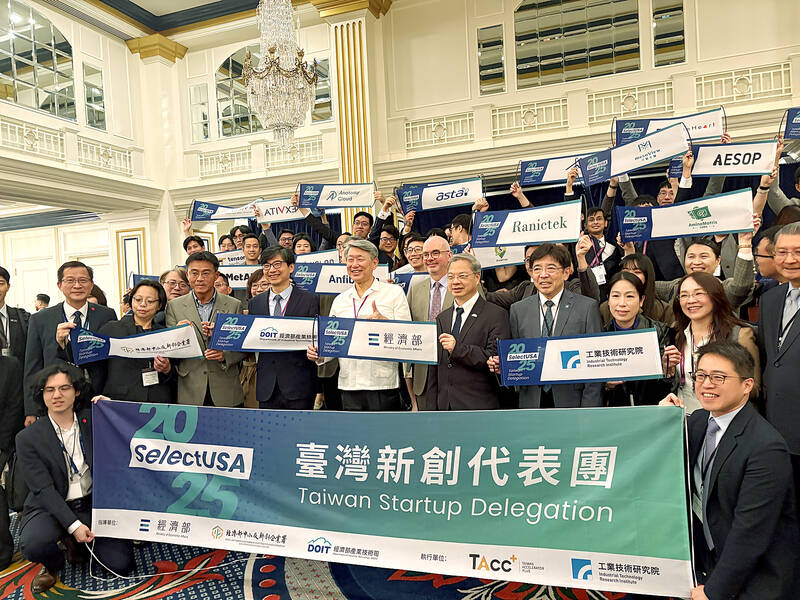Taiwanese companies would be “critical” in order to meet US President Donald Trump’s goal of reindustrializing the US, American Institute in Taiwan (AIT) Director Raymond Greene said on Sunday.
Greene made the remarks at a reception for Taiwan’s delegation at the US Department of Commerce’s 2025 SelectUSA Investment Summit, being held in Maryland from Sunday through tomorrow.
Ten years ago, 80 percent of Taiwan’s foreign investment went to China, but last year, more of it went to the US than to any other country, Greene said.

Photo: CNA
Just as Taiwanese companies were crucial to the industrialization of China 30 years ago, “we expect Taiwan companies to be just as critical to achieving President Trump’s mission for reindustrializing the United States,” he said.
The AIT has helped support the growing interest of Taiwanese companies in the US, particularly in fields such as semiconductors, artificial intelligence (AI) and quantum technology, he said.
The Taiwan delegation to the summit was the largest among all the participants, he added.
Cabinet Secretary-General Kung Ming-hsin (龔明鑫), who is leading the Taiwan delegation, and Minister of Economic Affairs J.W. Kuo (郭智輝), also spoke at the reception, urging the US Congress to pass legislation to prevent double taxation between Taiwan and the US.
The US-Taiwan Expedited Double-Tax Relief Act was approved by the US House of Representatives in January, but must still be passed by the Senate.
Meanwhile, Kung said Taiwan is seeking deeper military and economic cooperation with the US, despite Trump-imposed tariffs that have rattled business leaders in Taiwan.
The White House last month imposed hefty tariffs on trading partners globally including Taipei before pausing them for 90 days.
“We have seen the whole world express concern over the tariffs issue, and our president, [William] Lai (賴清德) has already met with the heads of major Taiwanese companies 10 times, which also shows their great concern,” Kung said.
He suggested the two countries could work together on security and technology.
“We can have research and development together in the area of drones, for example,” he said.
“The United States has advanced technologies and Taiwan is very strong in having a mass production of this kind of advanced technologies,” he added.
Kung touted an opportunity for “good cooperation” that could in turn benefit “enhancing our industrial security.”
About 60 percent of Taiwanese exports to the US fall within the information technology sector and are mainly semiconductors, which are used in everything from televisions and cars to weapons and supercomputers.
In a statement last week, Taiwan’s Cabinet said the delegation to the SelectUSA Investment Summit would include representatives from industries such as information and communications technology, semiconductors, AI, chemical engineering, biotechnology, smart manufacturing, aerospace and financial services.

POSITIVE DEVELOPMENT: Japan and the US are expected to hold in-depth discussions on Taiwan-related issues during the meeting next month, Japanese sources said The holding of a Japan-US leaders’ meeting ahead of US President Donald Trump’s visit to China is positive news for Taiwan, former Japan-Taiwan Exchange Association representative Hiroyasu Izumi said yesterday. After the Liberal Democratic Party’s landslide victory in Japan’s House of Representatives election, Japanese Prime Minister Sanae Takaichi is scheduled to visit the US next month, where she is to meet with Trump ahead of the US president’s planned visit to China from March 31 to April 2 for a meeting with Chinese President Xi Jinping (習近平). Japan and the US are expected to hold in-depth discussions on Taiwan-related issues during the

‘LIKE-MINDED PARTNER’: Tako van Popta said it would be inappropriate to delay signing the deal with Taiwan because of China, adding he would promote the issue Canadian senators have stressed Taiwan’s importance for international trade and expressed enthusiasm for ensuring the Taiwan-Canada trade cooperation framework agreement is implemented this year. Representative to Canada Harry Tseng (曾厚仁) in an interview with the Central News Agency (CNA) said he was increasingly uneasy about Ottawa’s delays in signing the agreement, especially as Ottawa has warmed toward Beijing. There are “no negotiations left. Not only [is it] initialed, we have three versions of the text ready: English, French and Mandarin,” Tseng said. “That tells you how close we are to the final signature.” Tseng said that he hoped Canadian Prime Minister Mark Carney

Taiwan has received more than US$70 million in royalties as of the end of last year from developing the F-16V jet as countries worldwide purchase or upgrade to this popular model, government and military officials said on Saturday. Taiwan funded the development of the F-16V jet and ended up the sole investor as other countries withdrew from the program. Now the F-16V is increasingly popular and countries must pay Taiwan a percentage in royalties when they purchase new F-16V aircraft or upgrade older F-16 models. The next five years are expected to be the peak for these royalties, with Taiwan potentially earning

President William Lai (賴清德) yesterday bestowed one of Taiwan’s highest honors on Saint Vincent and the Grenadines (SVG) Ambassador Andrea Clare Bowman in recognition of her contributions to bilateral ties. “By conferring the Order of Brilliant Star with Grand Cordon on Ambassador Bowman today, I want to sincerely thank her, on behalf of the Taiwanese people, for her outstanding contribution to deepening diplomatic ties between Taiwan and SVG,” Lai said at a ceremony held at the Presidential Office in Taipei. He noted that Bowman became SVG’s first ambassador to Taiwan in 2019 and